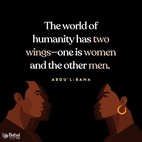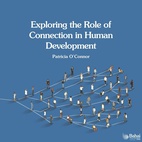The views expressed in our content reflect individual perspectives and do not represent the authoritative views of the Baha'i Faith.
Do you regularly try to engage in conversations that feel unproductive? Does it often seem like you’re trapped in argumentative dynamics?
So many things can get in the way of having productive conversations. Sometimes we don’t have a healthy or genuine dynamic with the people in those discussions. Other times we are deeply attached to our perspective for the sake of being right, or the person we are talking to is deeply attached to theirs for the sake of being right.
Whatever the reason, engaging in consultation that regularly leads to such limited progress can be exhausting. We can burn out from engaging in meaningful dialogue because it feels like it never goes anywhere. We can subconsciously start to believe that our opinion doesn’t matter, and check out intellectually rather than engaging with our world in a curious and effective way.
The Baha’i writings suggest that genuine consultation – the collective search for truth – is not only useful in allowing for our conversations to be productive, but also has the ability to push us to better understand the world around us. The question then becomes: what is true consultation and how do we engage in it? The teachings of the Baha’i Faith outline a number of requisites and considerations that we can all adopt when consulting with others and trying to come to a decision or an understanding.
When entering a conversation where we explore some part of reality with others, this passage from a talk Abdu’l-Baha gave in Paris suggests acknowledging and detaching from prejudice and self-serving mentalities:
If five people meet together to seek for truth, they must begin by cutting themselves free from all their own special conditions and renouncing all preconceived ideas. In order to find truth we must give up our prejudices, our own small trivial notions; an open receptive mind is essential. If our chalice is full of self, there is no room in it for the water of life. The fact that we imagine ourselves to be right and everybody else wrong is the greatest of all obstacles in the path towards unity, and unity is necessary if we would reach truth, for truth is one.
RELATED: How I Respond to Condescending Communication
Everyone can work on detaching from “trivial notions” and “prejudices” throughout all of our days. In fact, in order to really do a good job of entering hard conversations with an open mind, we will need to work on letting go of our own selfish and preconceived ideas.
We live in societies filled with prejudice and oppression, so if we want to be able to communicate with others from a place of receptivity, we will have to put in serious time and energy to unlearn prejudicial thinking. That means carefully listening to others, learning about the way that prejudice flourishes in our society institutionally, and then vigilantly paying attention to the way we operate day in and day out.
Of course, there are going to be times when we have a more clear understanding of a particular topic than others. We may have lived through things that others have not, or we may be well-versed in the research. It is easy to accidentally fall into a condescending response, and rather than opening up the topic this can cause a conversation to hit a wall. In his writings, Abdu’l-Baha warned:
… we should not belittle anyone and call him ignorant, saying: ’You know not, but I know’. Rather, we should look upon others with respect, and when attempting to explain and demonstrate, we should speak as if we are investigating the truth, saying: ’Here these things are before us. Let us investigate to determine where and in what form the truth can be found.’ The teacher should not consider himself as learned and others ignorant. Such a thought breedeth pride, and pride is not conducive to influence. The teacher should not see in himself any superiority; he should speak with the utmost kindliness, lowliness and humility, for such speech exerteth influence and educateth the souls.
RELATED: Silence: The Most Important Part of Communication
The tone with which we approach one another can make a world of difference in the ability of a conversation to lead to growth. We would undoubtedly see a shift in the way we communicate if more of us were to treat our conversations carefully, recognizing their great potential for internal or spiritual growth. The Baha’i teachings offer profound advice about the process of consultation actually being more for the spiritual practice of attaining unity, rather than for the need to find the right answer immediately:
It is my hope that the friends and the maid-servants of America become united on all subjects and not disagree at all. If they agree upon a subject, even though it be wrong, it is better than to disagree and be in the right, for this difference will produce the demolition of the divine foundation. Though one of the parties may be in the right and they disagree that will be the cause of a thousand wrongs, but if they agree and both parties are in the wrong, as it is in unity the truth will be revealed and the wrong made right.
It might do wonders for our consultative skills if we consistently remind ourselves that we have an opportunity to hone certain spiritual qualities each time we try to explore some part of reality with others or make some joint decision.

















Comments
Sign in or create an account
Continue with Googleor